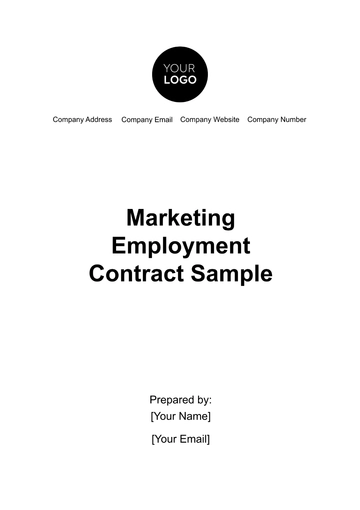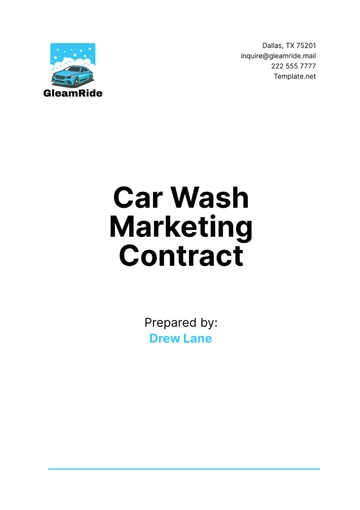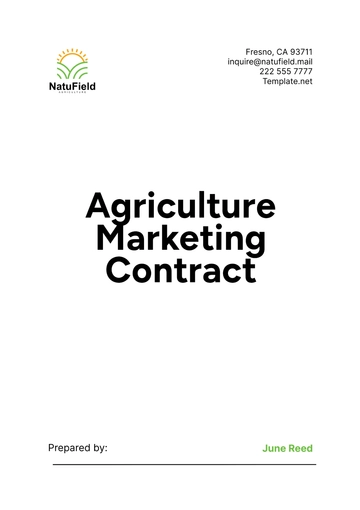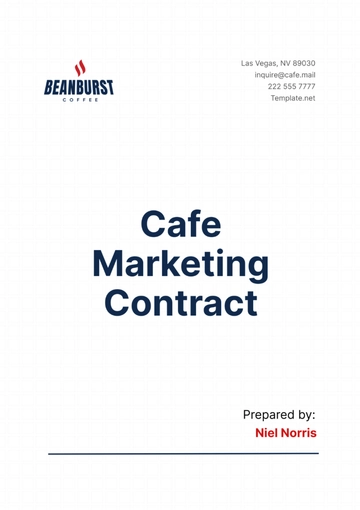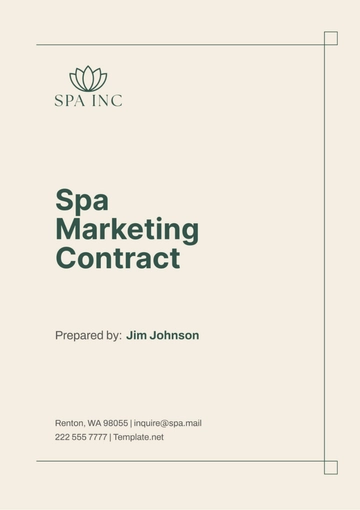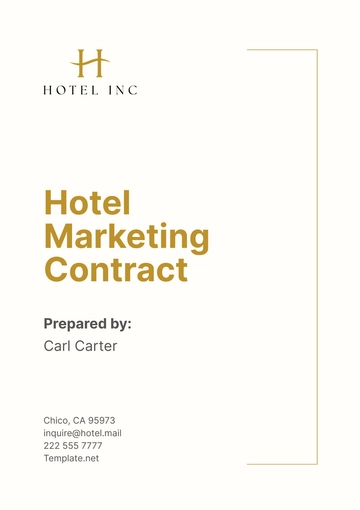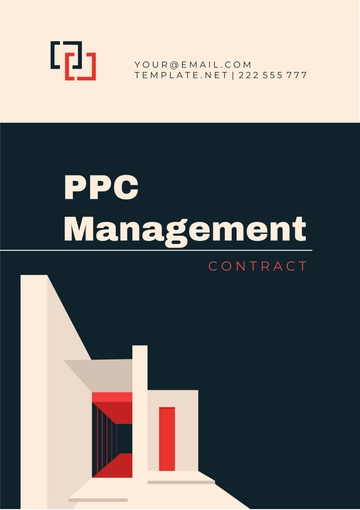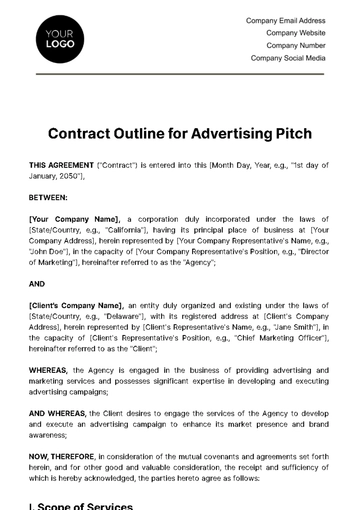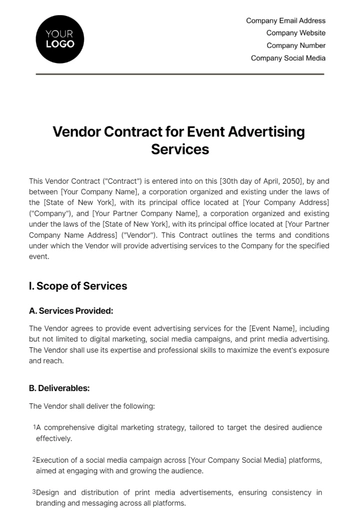Free Agriculture Marketing Contract
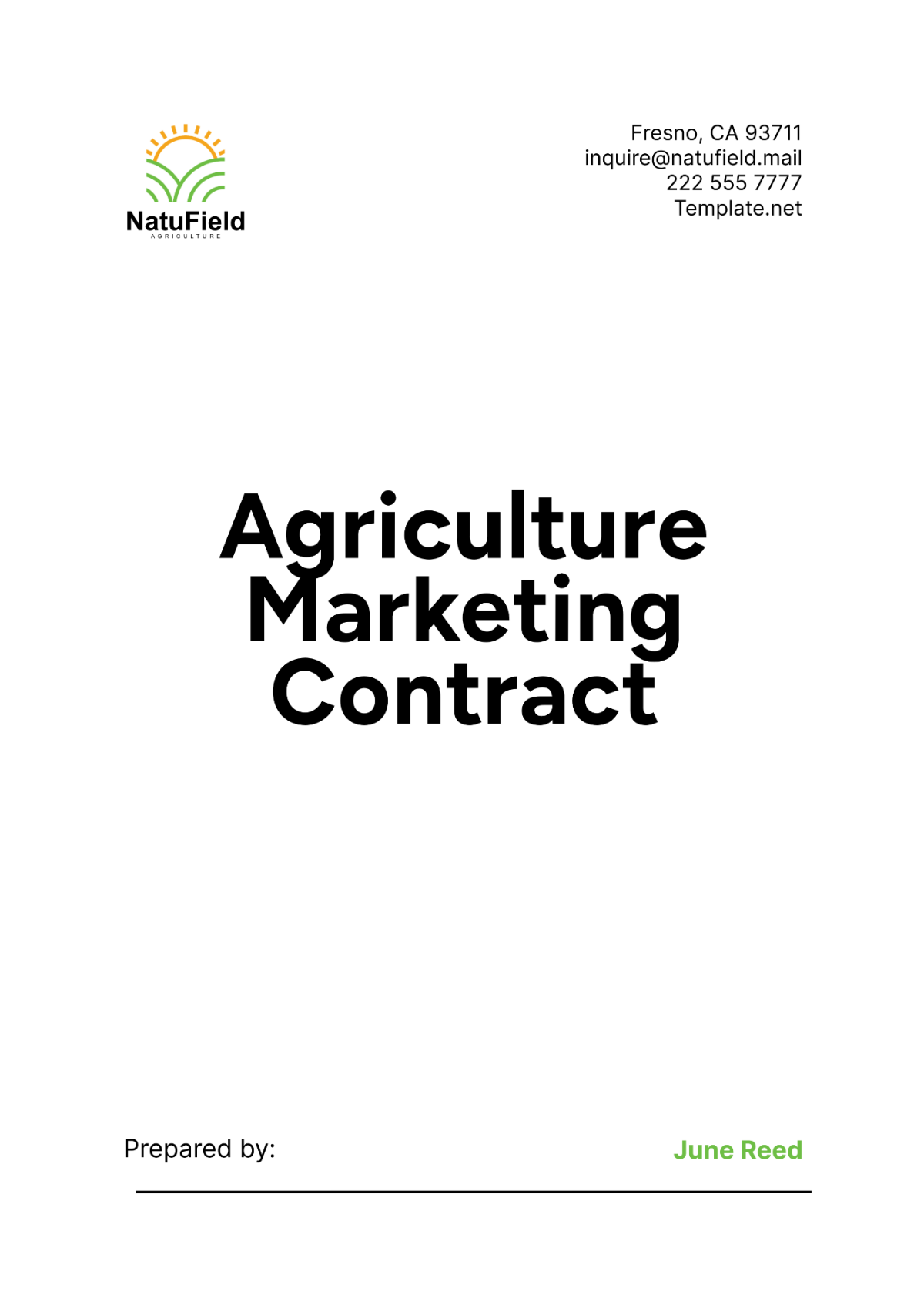
I. The Parties
This Agriculture Marketing Contract ("Contract") is made and entered into on [Month Day, Year] ("Effective Date") by and between [Your Company Name] hereinafter referred to as the ("Producer") with a primary place of business at [Your Company Address] and [Marketer's Name] hereinafter referred to as the ("Marketer") with a primary place of business at [Marketer's Address] may be referred to individually as a ("Party") or collectively referred to as the ("Parties").
WHEREAS, the Producer is engaged in the business of producing agricultural products and wishes to market, sell, and distribute these products;
WHEREAS, the Marketer is engaged in the business of marketing, selling, and distributing agricultural products on behalf of producers;
WHEREAS, the Parties wish to enter into this Contract to outline their respective roles and responsibilities in the marketing, sale, and distribution of the Producer's agricultural products;
NOW THEREFORE, in consideration of the mutual covenants and agreements contained herein, the Parties agree as follows:
II. Scope of Services
A. Marketing Efforts
Comprehensive Marketing Plan: The Marketer shall develop a comprehensive marketing plan to promote and sell the Producer's agricultural products. This plan will include strategies tailored to the target market and competitive landscape.
Advertising Campaigns: The Marketer shall execute digital, print, and media advertising campaigns to reach the target market. These campaigns will be designed to maximize exposure and engagement with potential buyers.
Monthly Reports: The Marketer will provide monthly reports on marketing activities and their effectiveness. These reports will include metrics and insights to help evaluate and improve marketing strategies.
Trade Show Representation: The Marketer shall attend agricultural trade shows and events to represent the Producer's products. This presence helps in networking and building brand recognition in the industry.
Online Presence: The Marketer shall maintain an up-to-date website and social media presence for the Producer's products. Regular updates and engagement on these platforms will help attract and retain customers.
B. Sales Activities
Sales Responsibility: The Marketer shall be responsible for selling the Producer's products to wholesalers, retailers, and direct consumers. This includes identifying potential buyers and closing sales deals.
Customer Management: The Marketer will manage all customer inquiries, orders, and complaints in a timely and professional manner. Effective customer service is essential for maintaining a positive reputation.
Invoicing and Payments: The Marketer shall handle all invoicing and payment collections from customers. Accurate and prompt financial transactions ensure smooth business operations.
Sales Performance Reports: The Marketer will report sales performance to the Producer on a monthly basis. These reports will include detailed sales data and insights for strategic planning.
C. Promotional Activities
Seasonal Promotions: The Marketer shall design and implement seasonal promotions to boost sales during peak times. Special offers and discounts can attract more customers and increase sales volumes.
Product Demonstrations: The Marketer shall organize product demonstrations and tastings to showcase the quality of the Producer's products. Direct interaction with consumers helps in building trust and driving sales.
Marketing Materials: The Marketer shall create and distribute marketing materials such as brochures, flyers, and posters. High-quality materials support promotional efforts and enhance brand visibility.
Collaborations and Sponsorships: The Marketer shall seek out collaboration opportunities with other brands and consider sponsorships to enhance brand presence. These partnerships can open new markets and increase product exposure.
III. Delivery and Distribution
A. Delivery Schedules
Detailed Delivery Schedule: The Producer shall provide the Marketer with a detailed delivery schedule on the [1st] day of each month. This schedule will outline the expected delivery dates and quantities.
Logistics Coordination: The Marketer is responsible for coordinating with logistics providers to ensure timely delivery of products. Efficient logistics management is crucial for meeting customer expectations.
Agreed Changes: Both Parties must agree on any changes to the delivery schedule at least [7] days in advance. This allows for adequate planning and adjustment to avoid disruptions.
Notification of Delays: In the case of delays, the responsible Party must notify the other Party immediately and provide a revised delivery timeline. Clear communication helps manage expectations and minimize inconvenience.
B. Distribution Channels
Channel Identification: The Marketer shall identify and utilize appropriate distribution channels for the Producer's products. Effective distribution strategies ensure products reach the intended market efficiently.
Contract Management: The Marketer shall negotiate and manage contracts with distributors and wholesalers. Proper contract management ensures reliable and profitable distribution relationships.
Compliance with Laws: The Marketer will ensure that all distribution partners comply with relevant laws and regulations. Legal compliance is essential to avoid penalties and maintain business integrity.
Updated Distribution List: The Marketer will maintain an updated list of all distribution channels and provide it to the Producer on a quarterly basis. Keeping track of distribution partners ensures effective monitoring and management.
C. Storage and Handling
Proper Storage Conditions: The Marketer shall ensure that the products are stored under proper conditions to maintain their quality. Adequate storage facilities are essential for preserving product integrity.
Handling Procedures: The Marketer shall establish and enforce proper handling procedures to prevent damage to the products. Careful handling during transportation and storage minimizes losses.
Inventory Management: The Marketer shall implement an effective inventory management system to track stock levels and ensure timely replenishment. Efficient inventory control helps prevent stockouts and overstocking.
Training and Supervision: The Marketer shall provide training and supervision to personnel involved in the storage and handling of products. Well-trained staff contribute to maintaining high-quality standards.
IV. Pricing
A. Price Setting
Mutual Agreement: The Producer and Marketer shall mutually agree on the pricing of the agricultural products. Collaborative pricing decisions help align business objectives.
Market Considerations: Pricing strategies shall consider market demand, production costs, and competitor prices. A well-informed pricing approach ensures competitiveness and profitability.
Approval of Adjustments: All price adjustments must be approved by both Parties before implementation. Joint approval processes prevent misunderstandings and ensure alignment.
B. Payment Terms
Direct Payments: Customers shall make payments directly to the Marketer. This centralizes financial transactions and simplifies payment processes.
Remittance to Producer: The Marketer shall remit payments to the Producer on a [bi-weekly] basis, minus an agreed-upon marketing fee of [10]%. Regular remittances ensure steady cash flow for the Producer.
Delayed Payments: In case of delayed payments from customers, the Marketer shall notify the Producer and take reasonable action to collect overdue amounts. Prompt action helps recover outstanding payments.
C. Discounts and Incentives
Volume Discounts: The Marketer may offer volume discounts to encourage bulk purchases. Attractive discount schemes can drive higher sales volumes.
Early Payment Incentives: The Marketer may provide incentives for early payments to improve cash flow. Early payment discounts benefit both the Marketer and Producer.
Promotional Discounts: The Marketer may implement promotional discounts during special campaigns. Temporary price reductions can attract new customers and boost sales.
V. Quality Standards
A. Product Quality
Quality Guarantee: The Producer guarantees that all products meet the specified quality standards agreed upon by both Parties. This assurance builds trust and reliability.
Quality Documentation: The Producer will provide the Marketer with quality certificates and any other relevant documentation. Proper documentation supports compliance and transparency.
Inspection Rights: The Marketer has the right to inspect the products for quality before accepting them for marketing. Regular inspections help maintain high standards.
B. Quality Control
Quality Control System: The Producer shall implement a quality control system to ensure consistent product quality. Systematic quality control processes prevent defects and maintain standards.
Complaint Reporting: The Marketer will report any quality complaints from customers to the Producer immediately. Prompt reporting helps address issues swiftly.
Collaborative Resolution: Both Parties shall collaborate to resolve any quality issues promptly. Joint efforts ensure effective problem-solving and customer satisfaction.
Recall Costs: The Producer will bear the costs of any necessary product recalls due to quality defects. This financial responsibility emphasizes the importance of quality assurance.
C. Continuous Improvement
Quality Audits: The Producer shall conduct regular quality audits to identify areas for improvement. Continuous evaluation helps maintain and enhance product standards.
Feedback Mechanism: The Marketer shall establish a feedback mechanism for customers to report quality issues. Customer feedback provides valuable insights for quality enhancement.
Training Programs: The Producer shall implement training programs for staff to ensure adherence to quality standards. Well-trained personnel contribute to maintaining high-quality products.
Improvement Plans: Both Parties shall develop and implement improvement plans based on audit findings and feedback. Continuous improvement ensures ongoing quality enhancement.
VI. Confidentiality
A. Confidential Information
Confidentiality Agreement: Both Parties agree to keep all information regarding the pricing, marketing strategies, and customer data confidential. This agreement protects sensitive business information.
Non-Disclosure: Confidential information shall not be disclosed to any third party without prior written consent of the non-disclosing Party. This clause ensures information security.
Legal Action for Breach: Any breach of confidentiality shall be subject to legal action and compensatory damages. Legal consequences deter potential breaches.
B. Non-Disclosure Agreement
Signing of NDA: Both Parties agree to sign a separate Non-Disclosure Agreement (NDA) which shall be appended to this Contract. This formalizes the confidentiality commitment.
Duration of NDA: The NDA shall be in effect for the duration of this Contract and for a period of [3] years after termination. Extended protection ensures long-term confidentiality.
Dispute Resolution for NDA: Any disputes arising from the NDA shall be resolved as per the dispute resolution mechanism outlined in Section IX. This integration provides a clear process for resolving confidentiality issues.
C. Exceptions
Public Information: Confidentiality obligations shall not apply to information that is publicly known. Publicly available information is not subject to confidentiality restrictions.
Independent Development: Confidentiality obligations do not cover information independently developed by either Party. This exception encourages innovation and independent work.
Third-Party Disclosure: Confidentiality obligations shall not apply to information lawfully obtained from a third party. Legal and ethical third-party information is exempt from confidentiality requirements.
VII. Liability and Indemnification
A. Liability
Negligence and Misconduct: Each Party shall be liable for any losses or damages resulting from their own negligence or willful misconduct. Accountability for actions ensures responsible behavior.
Product Liability: The Producer shall be responsible for any product liability issues arising from defects in the products. Ensuring product safety and compliance is paramount.
Unauthorized Marketing: The Marketer shall be responsible for any liability arising from marketing activities not authorized by the Producer. Unauthorized actions are outside the agreed scope.
B. Indemnification
Mutual Indemnification: Each Party agrees to indemnify and hold the other Party harmless from any claims, actions, or damages resulting from their own actions. Mutual indemnification provides balanced protection.
Coverage of Legal Fees: Indemnification includes, but is not limited to, legal fees, financial losses, and damage compensation. Comprehensive coverage ensures full protection.
Notification of Claims: The indemnified Party must promptly notify the indemnifying Party of any claims or actions. Prompt notification allows timely defense and resolution.
C. Limitation of Liability
Cap on Damages: Neither Party shall be liable for any indirect, incidental, or consequential damages arising from this Contract. Limiting liability protects both Parties from excessive claims.
Force Majeure: Neither Party shall be liable for any failure to perform due to causes beyond their reasonable control, such as natural disasters, war, or acts of government. Force majeure clauses provide protection against unforeseeable events.
Mitigation of Damages: Both Parties agree to take reasonable steps to mitigate any damages arising from breaches of this Contract. Efforts to minimize losses are expected and appreciated.
VIII. Term and Termination
A. Term
Commencement Date: This Contract shall commence on the Effective Date and continue for a term of [2] years unless terminated earlier. Defining the term ensures clarity on the duration of the agreement.
Renewal Terms: The Contract may be renewed for additional terms of [1] year upon mutual agreement of the Parties. Renewal options provide flexibility for extending the business relationship.
Review Period: Both Parties shall review the Contract at least [90] days before the end of the term to discuss potential renewal or termination. A review period allows for informed decision-making.
B. Termination
Termination Notice: Either Party may terminate this Contract with [30] days written notice to the other Party. Notice periods provide time for orderly termination.
Immediate Termination: Termination may occur immediately if either Party breaches any material term of this Contract. Immediate termination clauses address severe breaches swiftly.
Settlement of Obligations: Upon termination, all outstanding payments and obligations shall be settled within [15] days. Prompt settlement ensures financial closure.
C. Post-Termination Obligations
Return of Property: Each Party shall return any property, including documents and materials, belonging to the other Party upon termination. Returning property ensures proper handover and closure.
Confidentiality Continuation: Confidentiality obligations shall continue for the period specified in the NDA even after termination. Continued confidentiality protects sensitive information.
Final Reports: The Marketer shall provide a final report on all marketing and sales activities up to the termination date. Final reports provide closure and documentation of activities.
D. Transition Assistance
Transition Period: Both Parties agree to a transition period of [30] days post-termination to ensure a smooth handover of responsibilities. Transition periods facilitate continuity.
Support Services: The Marketer shall provide support services during the transition to help the Producer manage ongoing activities. Support services ensure a seamless transition.
Customer Communication: Both Parties shall communicate with customers about the termination and transition to ensure continuity and clarity. Clear communication maintains customer trust.
IX. Dispute Resolution
A. Mediation
Initial Resolution Step: In case of a dispute, the Parties agree to first attempt to resolve the issue through mediation. Mediation encourages amicable solutions.
Neutral Mediator: Mediation shall be conducted by a neutral third party agreed upon by both Parties. Neutral mediators ensure impartiality.
Equal Cost Sharing: Costs of mediation shall be borne equally by both Parties. Equal cost sharing promotes fairness and commitment to the process.
B. Arbitration
Arbitration Agreement: If mediation fails, the dispute shall be resolved via arbitration as per the rules of [Arbitration Organization's Name]. Arbitration provides a structured and binding resolution.
Location and Binding Nature: Arbitration shall take place in [State Name] and be binding on both Parties. Specified location and binding nature ensure clarity and enforceability.
Cost Responsibility: Each Party shall bear its own costs related to the arbitration proceedings. Individual cost responsibility encourages careful consideration of arbitration.
C. Litigation
Court Jurisdiction: Any legal action or proceeding arising out of or relating to this Contract shall be brought exclusively in the federal or state courts located in [State Name]. Specified jurisdiction ensures clarity on the legal venue.
Waiver of Objections: The Parties waive any objections to the jurisdiction and venue of such courts. Waiving objections ensures acceptance of the specified legal forum.
Legal Fees: In the event of litigation, the prevailing Party shall be entitled to recover reasonable attorney fees and court costs. This provision encourages fair and justified legal actions.
X. Miscellaneous
A. Entire Agreement
Supersession of Prior Agreements: This Contract constitutes the entire agreement between the Parties and supersedes all prior agreements or understandings, whether written or verbal. A comprehensive agreement ensures clarity and completeness.
Amendments: Any amendments to this Contract must be in writing and signed by both Parties. Formal amendments maintain the integrity of the Contract.
B. Governing Law
Applicable Law: This Contract shall be governed by and construed in accordance with the laws of the State of [State Name]. Specified governing law provides a clear legal framework.
Exclusive Venue: Any legal action or proceeding arising out of or relating to this Contract shall be brought exclusively in the federal or state courts located in [State Name]. Exclusive venue clauses prevent jurisdictional disputes.
C. Severability
Validity of Provisions: If any provision of this Contract is found to be invalid or unenforceable, the remaining provisions shall continue in full force and effect. Severability ensures the Contract's overall enforceability.
Renegotiation of Invalid Provisions: Both Parties agree to renegotiate any invalid or unenforceable provision to reflect the original intent of the Parties as closely as possible. Renegotiation maintains the Contract's purpose.
D. Notices
Written Notices: All notices under this Contract shall be in writing and sent to the respective addresses of the Parties. Written notices ensure clear and documented communication.
Deemed Receipt: Notices shall be deemed received [3] business days after being sent via registered mail. Deemed receipt clauses provide certainty on notice timelines.
Address Changes: Both Parties agree to notify each other of any address changes within [10] days. Timely notification ensures accurate and effective communication.
E. Force Majeure
Definition: Neither Party shall be liable for any failure to perform due to causes beyond their reasonable control, such as natural disasters, war, or acts of government. Force majeure clauses protect against unforeseeable events.
Notification Requirement: The affected Party must notify the other Party as soon as possible of the force majeure event and its expected impact. Prompt notification allows for appropriate adjustments.
Mitigation Efforts: Both Parties agree to use all reasonable efforts to mitigate the effects of the force majeure event and resume normal performance as soon as possible. Mitigation efforts demonstrate good faith and cooperation.
XI. Signatures
IN WITNESS WHEREOF, the Parties hereto have executed this Contract as of the Effective Date.
Producer

[Authorized Representative Name]
[Your Company Name]
Date: [Month Day, Year]
Marketer

[Authorized Representative Name]
[Marketer's Name]
Date: [Month Day, Year]
- 100% Customizable, free editor
- Access 1 Million+ Templates, photo’s & graphics
- Download or share as a template
- Click and replace photos, graphics, text, backgrounds
- Resize, crop, AI write & more
- Access advanced editor
Marketing partnerships secured with our Agriculture Marketing Contract Template! Available on Template.net, this template offers customizable sections for business branding integration. Editable fields make it easy to tailor the contract to your terms. The AI Editor Tool ensures quick and accurate creation, providing a professional marketing contract for your needs!
You may also like
- Rental Contract
- Contractor Contract
- Contract Agreement
- One Page Contract
- School Contract
- Social Media Contract
- Service Contract
- Business Contract
- Restaurant Contract
- Marketing Contract
- Real Estate Contract
- IT Contract
- Cleaning Contract
- Property Contract
- Supplier Contract
- Partnership Contract
- Food Business Contract
- Construction Contract
- Employment Contract
- Investment Contract
- Project Contract
- Payment Contract
- Student Contract
- Travel Agency Contract
- Startup Contract
- Annual Maintenance Contract
- Employee Contract
- Gym Contract
- Event Planning Contract
- Personal Contract
- Nursing Home Contract
- Law Firm Contract
- Work from Home Contract
- Software Development Contract
- Maintenance Contract
- Music Contract
- Amendment Contract
- Band Contract
- DJ Contract
- University Contract
- Salon Contract
- Renovation Contract
- Photography Contract
- Lawn Care Contract






